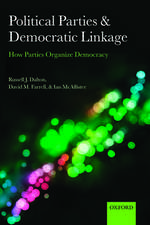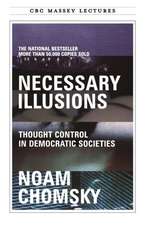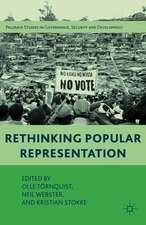Democratization in Morocco: The Political Elite and Struggles for Power in the Post-Independence State: Routledge Studies in Middle Eastern Politics
Autor Lise Stormen Limba Engleză Paperback – 29 iul 2010
Lise Storm demonstrates that in at least some instances, democratization has been more than simply a survival strategy – every so often, key figures within the political elite have taken the democratization process further than strictly needed for them to stay in power. In the case of Morocco, it has been the monarch who on more than one occasion has moved the country further towards the democratic ideal than he necessarily had to, and that sometimes even against the wishes of one or more of the established political parties. This book illustrates how the Moroccan political parties, like so many of their counterparts in the region, have become the main obstacle to further democratization as most of them have never honoured – or appear to have abandoned – the key function of political parties: popular representation.
Democratization in Morocco will be a very valuable contribution to students and researchers interested in the dynamics behind the Moroccan democratization and the role of electoral politics in North African and Middle Eastern politics.
| Toate formatele și edițiile | Preț | Express |
|---|---|---|
| Paperback (1) | 341.20 lei 6-8 săpt. | |
| Taylor & Francis – 29 iul 2010 | 341.20 lei 6-8 săpt. | |
| Hardback (1) | 1059.84 lei 6-8 săpt. | |
| Taylor & Francis – 18 oct 2007 | 1059.84 lei 6-8 săpt. |
Din seria Routledge Studies in Middle Eastern Politics
-
 Preț: 311.41 lei
Preț: 311.41 lei -
 Preț: 280.08 lei
Preț: 280.08 lei -
 Preț: 309.89 lei
Preț: 309.89 lei -
 Preț: 294.53 lei
Preț: 294.53 lei - 9%
 Preț: 1004.93 lei
Preț: 1004.93 lei - 18%
 Preț: 1065.06 lei
Preț: 1065.06 lei - 18%
 Preț: 1170.14 lei
Preț: 1170.14 lei - 12%
 Preț: 300.49 lei
Preț: 300.49 lei - 18%
 Preț: 1060.87 lei
Preț: 1060.87 lei - 12%
 Preț: 300.49 lei
Preț: 300.49 lei - 18%
 Preț: 1162.08 lei
Preț: 1162.08 lei - 26%
 Preț: 850.37 lei
Preț: 850.37 lei - 18%
 Preț: 1066.09 lei
Preț: 1066.09 lei - 18%
 Preț: 1057.05 lei
Preț: 1057.05 lei - 18%
 Preț: 1059.48 lei
Preț: 1059.48 lei - 18%
 Preț: 1166.01 lei
Preț: 1166.01 lei - 18%
 Preț: 1067.14 lei
Preț: 1067.14 lei - 25%
 Preț: 854.33 lei
Preț: 854.33 lei -
 Preț: 418.22 lei
Preț: 418.22 lei -
 Preț: 412.27 lei
Preț: 412.27 lei - 18%
 Preț: 1066.09 lei
Preț: 1066.09 lei - 18%
 Preț: 1056.00 lei
Preț: 1056.00 lei -
 Preț: 289.05 lei
Preț: 289.05 lei - 18%
 Preț: 1060.87 lei
Preț: 1060.87 lei - 18%
 Preț: 996.33 lei
Preț: 996.33 lei - 18%
 Preț: 1058.43 lei
Preț: 1058.43 lei - 18%
 Preț: 1056.00 lei
Preț: 1056.00 lei - 18%
 Preț: 1061.57 lei
Preț: 1061.57 lei - 26%
 Preț: 822.36 lei
Preț: 822.36 lei - 18%
 Preț: 1060.52 lei
Preț: 1060.52 lei - 18%
 Preț: 1439.85 lei
Preț: 1439.85 lei - 18%
 Preț: 1163.19 lei
Preț: 1163.19 lei - 18%
 Preț: 1057.75 lei
Preț: 1057.75 lei - 26%
 Preț: 821.29 lei
Preț: 821.29 lei - 18%
 Preț: 1058.79 lei
Preț: 1058.79 lei - 18%
 Preț: 1057.75 lei
Preț: 1057.75 lei - 18%
 Preț: 1056.32 lei
Preț: 1056.32 lei - 18%
 Preț: 1058.43 lei
Preț: 1058.43 lei - 25%
 Preț: 824.70 lei
Preț: 824.70 lei - 18%
 Preț: 1060.25 lei
Preț: 1060.25 lei - 18%
 Preț: 1060.87 lei
Preț: 1060.87 lei - 18%
 Preț: 1071.30 lei
Preț: 1071.30 lei - 26%
 Preț: 820.03 lei
Preț: 820.03 lei - 18%
 Preț: 1056.35 lei
Preț: 1056.35 lei - 18%
 Preț: 1057.05 lei
Preț: 1057.05 lei
Preț: 341.20 lei
Nou
Puncte Express: 512
Preț estimativ în valută:
65.31€ • 67.92$ • 54.73£
65.31€ • 67.92$ • 54.73£
Carte tipărită la comandă
Livrare economică 13-27 martie
Preluare comenzi: 021 569.72.76
Specificații
ISBN-13: 9780415599399
ISBN-10: 0415599393
Pagini: 240
Ilustrații: 4 Line drawings, black and white; 16 Tables, black and white
Dimensiuni: 156 x 234 x 13 mm
Greutate: 0.42 kg
Ediția:1
Editura: Taylor & Francis
Colecția Routledge
Seria Routledge Studies in Middle Eastern Politics
Locul publicării:Oxford, United Kingdom
ISBN-10: 0415599393
Pagini: 240
Ilustrații: 4 Line drawings, black and white; 16 Tables, black and white
Dimensiuni: 156 x 234 x 13 mm
Greutate: 0.42 kg
Ediția:1
Editura: Taylor & Francis
Colecția Routledge
Seria Routledge Studies in Middle Eastern Politics
Locul publicării:Oxford, United Kingdom
Public țintă
PostgraduateCuprins
Introduction 1. Government after Independence: Indigenous Leadership with Colonial Habits, 1956-72 2. Government after Independence II: Indigenous Leadership with Colonial Habits, 1972-90 3. Intensification of the Democratization Process, 1990-96 4. Reasonably Competitive, Free and Fair Elections (1996-2006) 5. Basic Civil Liberties (1996-2006) 6. Independent Government (1996-2006) 7. Independent Government, II. Conclusion: Dynamics of Democratization in Post-Independence Morocco
Notă biografică
Lise Storm is Lecturer in Middle East Politics at the Department of Politics, University of Exeter, UK. Her main fields of research are democratization and party system theory, focusing mainly on experiences from Latin America and the Middle East.
Recenzii
'Storm's Democratization in Morocco is well balanced and judicious in its empirical analysis and could be used in any upper division undergraduate course or introductory graduate course on democratization in the Middle East and North Africa' - Mohamed Daadaoui, Oklahoma City University, Int. J. Middle East Studies. 41 (2009)
Descriere
This book explores the political games of the Moroccan democratization process in the period from independence in 1956 until 2006. The purpose of the book is not only to analyze the strategies and actions of the various political actors, but also to evaluate the level of democracy present in the country after the adoption of new constitutions in 1962, 1970, 1972, 1980, 1992 and 1996.
















